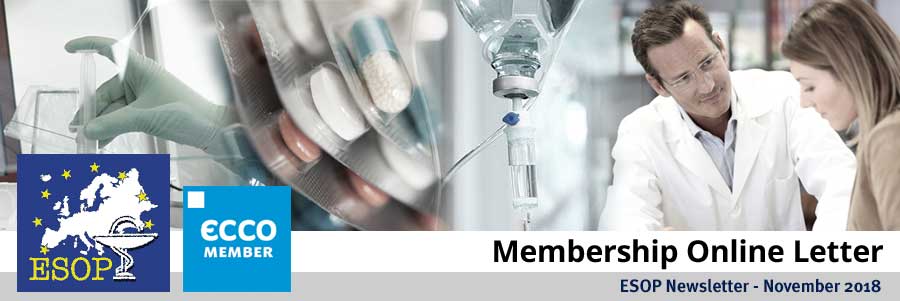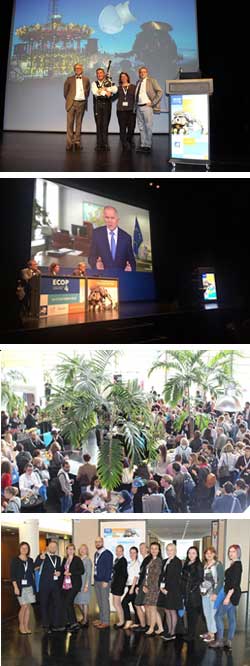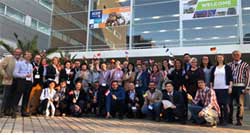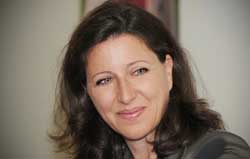| If you have trouble viewing the newsletter, please click here. |

|
Dear ESOP Members, We have left behind the 4th European Congress of Oncology Pharmacy (ECOP4). We are happy to meet our friends, meet new people and share information in the congress held in Nantes, France. Thanks to all participants... November newsletter includes the texts under the topics of Oncology Pharmacy in Spain, New plan for �good health� in France, ECOP4 in Nantes and Leukemia care lecture at ECOP4. Best regards, Eda Gedikoglu Chair of Publication |
|
ONCOLOGY PHARMACY IN SPAIN 1. Who can be an oncology pharmacist? The current Pharmacy University Degree consists of five years of theoretical and practical training, including 6 months of supervised professional experience (community or hospital).
Considering the post-specialisation education in oncology, the continuing education of hospital pharmacists is mostly organised and promoted by our National society SEFH through our Oncology working group GEDEFO. 2. Do you have an oncology pharmacy training or internship? Can you describe the process in detail? The key aspects of the BCOP program are:
Teaching methodology
Duration: November – October Teaching methodology: sessions
4. Is it mandatory to work oncology pharmacist in the oncology clinics? It’s not mandatory but is recommended. 4. Where do oncology pharmacists work? Where do they work most? The oncology pharmacist is an integral member of the cancer care team, who participate in clinical rounds, spends their time in the outpatient and inpatient unit. 5. What are the duties and responsibilities of the oncology pharmacists? The oncology pharmacist is involved in the whole Chemotherapy loop. From Prescription to administration. He/She as active collaboration in all the steps
6. Is there an oncology pharmacy association? How many members do the association have? Please give information about the association’s works. GEDEFO is the Oncology Pharmacy group that is part of the National Hospital Pharmacy Association. GEDEFO is a big group, with more than 200 members. Our main objective is to promote Oncology Pharmacy through professional activities and meetings in order to improve oncology education. 7. Where is the oncology medicines provided from? Oncology drugs are provided from the hospital pharmacy, just symptom control drugs are dispensed through community pharmacies. So, the oncology pharmacist is informed of patients treatments, can advice on all the oral treatments, follow the adherence to the oral chemotherapy. Chemotherapy drugs are not usually dispensed through community pharmacies. 8. Where can patients take treatments? Are these treatments paid by the country? Please explain. Most of the oncology treatments are free for the patients, because our National Health Service, acting through the different regional health services, covers oncology treatments. 9.Are there any planned arrangements in the future? GEDEFO is reinforcing the collaboration with other oncology health care societies trying to develop collaborative position papers or other documents. As a result of this the role and activity of the oncology pharmacist becomes even stronger. Reported by Estela Moreno Martinez, Spain |
|
ECOP4 in Nantes 4th European Congress of Oncology Pharmacy (ECOP4) was held on 25-27th October in Nantes, France. Presentations and workshops were held on current topics which provide a distinct multi-professional setting and multidisciplinary approach to promote the highest standards of pharmaceutical care in the management and support of patients with tumours. The target audence of the congress was not only oncology pharmacists but also hospital pharmacists, community pharmacists, medical oncologists, oncology physicians, pharmacy nurses, pharma industry. Approximately 470 participants from around 50 countries attended to the congress. At the opening ceremony our French friends performed an enjoyable music show with Breton. In the same time, ESOP board , ESOP delegates and all the ESOP members are also members of a large family. Shares continue, new friendships are established and friendships are strengthened. We invite all Oncology Pharmacists to be part of this great family. We believe that by the time we multiply, we become stronger. When we walk the same purpose, we move faster on this road.
Repored by Eda Gedikoğlu, Turkey |


ESOP Delegate meeting was held on 24th October 2018 in Nantes with 40 country delegates participitation. |
|
LEUKEMIA CARE LECTURE AT ECOP4 |
|
|
At ECOP 4 in Nantes, Mister N. York gave a lecture on patient perspectives with regard to leukemia cancer care. Mister York of Leukaemia Care UK works with the National Cancer Research Institute as a clinical study group consumer member and is also a member of the steering committee of the global CLL Advocacy Network. |

|
|
A novel project that he highlighted in the lecture is the “Spot Leukemia” programme, which was developed to improve awareness for the signs and symptoms of leukaemia, amongst both the public and the healthcare professionals who can aid in earlier diagnosis (such as general practitioners, general practice nurses and pharmacists). Reported by Mirjam Crul, Holland |
|
|
New plan for �good health� in France The French Ministry for Health and Solidarity, Agnes Buzyn, which is an Onco-hematologist, has launch an ambitious plan to allow the French population TO "BORN, GROW, LIVE AND AGING IN GOOD HEALTH" |

|
|
It is turned towards a logic of efficiency: "for each age group and for each risk, it targets what works, it generalizes, facilitates, informs, financially supports," said the Prime Minister. Edouard Philippe
The plan aims to increase the visibility of the message "zero alcohol during pregnancy" by better informing women of the risks involved. 1 in 1000 children is born today with a disability related to Fetal Alcohol Syndrome.
Launch of a national awareness campaign and identification of hearing disorders among young people aged 15 to 16 (risks induced by bad use of headsets).
This is a sexual health prevention program that will include the introduction of a card giving free access to condoms. It must be remembered that barely 53% of young people aged 15 to 24 used a condom during their last sexual encounter.
Last January, the Government made the 11 vaccines that were only recommended for young children mandatory. Since experiences of vaccination by CPS were a great success, this possibilities will by extended
This measure replaces the withdrawal assistance package of € 150 per year currently in place. This removes the brakes related to the systematic advance of fees and the same tariff for a product throughout the territory. France currently has 13 million smokers. Tobacco kills 73,000 people each year in France. Lung cancer is becoming the leading cause of cancer death among women (10,000 deaths in 2017). In this area, community pharmacists which deliver these products will be an invaluable aid.
As is the case for breast cancer and colorectal cancer, screening will be 100% (for all women who have not smeared in the last 3 years). Reported by Alain Astier, France |
|
 |
European Society of Oncology Pharmacy |
|
| If you don't want to recieve any further ESOP Newsletters, please click to unsubscribe. |